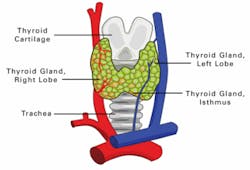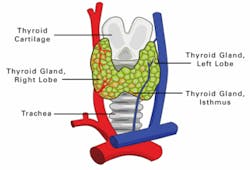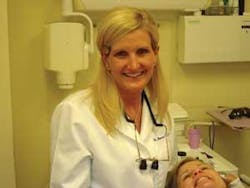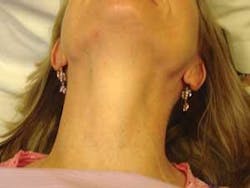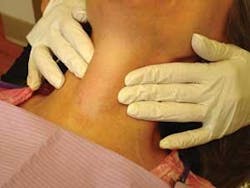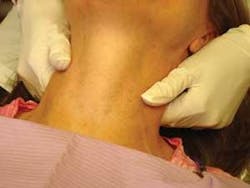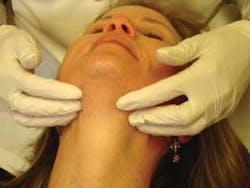Thyroid Cancer
The dental professional’s role in early detection
by Dianne Glasscoe-Watterson, RDH, MBA
A thorough extraoral examination can lead to the detection of abnormalities in the throat area, including thyroid cancer. Dentists and dental hygienists are taught in school how to perform extraoral assessments, but how many actually include the extraoral exam in their protocol?
Dr. Monica Parham graduated from dental hygiene school in 1987 from Northeast Mississippi Community College. She earned a bachelor’s degree in dental hygiene in 1989 from the University of Southern California, and then graduated from dental school at the University of Southern California in 1993. Her practice is located in Germantown, Md. Dr. Parham feels the extraoral examination is of utmost importance, as she has detected abnormal nodules in the throat area on five different patients. Upon referral, four of the abnormalities were thyroid cancer and one was a benign thyroid tumor.
The patients diagnosed with thyroid tumors from Dr. Parham’s practice were all thin, healthy females. Four were ages 28 to 38, and one was in her 50s with a history of breast cancer. All had children, all were nonsmokers, and none drank alcohol to excess. One was a pediatrician who had a complete physical exam two weeks prior to her dental exam, and nothing abnormal was detected. Her thyroid cancer was an aggressive form that, had it not been detected early, could have resulted in death.
Thyroid tumors
The thyroid is a butterfly-shaped gland under the Adam’s apple with two lobes on the right and left joined by an isthmus. According to the American Cancer Society, there were 37,340 new cases of thyroid cancer in the United States in 2008, and the majority of those were in women. If detected early, the five-year survival rate is almost 97%. It is estimated about one in 20 thyroid nodules is cancerous. Nodules that are too small to palpate can often be detected with an ultrasound test. Thyroid cancer is three times more common in women than men and is typically found in people ages 20 to 60. The cause of thyroid cancer is unknown, but several risk factors have been identified, including iodine deficiencies, exposure to radiation, and genetics. The main purpose of the thyroid gland is to help regulate a person’s metabolism. Too much thyroid hormone (a condition called hyperthyroidism) can cause a rapid or irregular heartbeat, trouble sleeping, nervousness, hunger, weight loss, and a feeling of being too warm. Too little hormone (called hypothyroidism) causes a person to slow down, feel tired, and gain weight.
The thyroid exam
Because the thyroid gland is right under the skin, changes in its size and shape can often be felt or seen. Many cases of thyroid cancer are found early, which increases the odds of successful treatment. Dental professionals can play an important role in detecting nodules and enlargement of the thyroid gland. One advantage for the dental clinician is that having the patient in a supine position allows the thyroid to protrude, thereby making it easier to palpate.
The thyroid exam should begin with the patient in a supine position, and with a visual inspection of the neck area for enlargement or asymmetry. The clinician should then move to the 12 o’clock position and use both hands to conduct a bilateral tactile examination, working up both sides of the trachea to the angle of the jaw and lymph nodes and ending with the TMJ area.
Dr. Parham believes her hygiene training made her prevention-oriented. She also credits her general practice residency at the V.A. hospital in West Los Angeles (where she served as chief resident in 1995) with instilling the importance of detecting cancer early. Dr. Parham states, “Doing a thorough extraoral exam only takes a short time, and it can save someone’s life. We’re supposed to be a health care profession. Don’t take the ‘care’ out of health care.”
An article published in the Journal of Dental Hygiene (2001, Fall; 75(4): 282-289) suggests that the extraoral examination is not offered frequently to patients in the dental setting. With the increasing recognition of the value of screening methods to overall health, dentists and dental hygienists have the opportunity to provide a valuable service to their patients. A thorough extraoral/intraoral examination is part of the standard of care that should not be neglected by dental professionals. Dental professionals can save lives through early detection screenings such as thyroid examinations.
null
About the Author
Dianne Glasscoe-Watterson, RDH, BS, MBA, is a professional speaker, writer, and consultant to dental practices across the United States. She is CEO of Professional Dental Management, based in Frederick, Md. To contact Glasscoe-Watterson for speaking or consulting, call (301) 874-5240 or e-mail dg [email protected]. Visit her Web site at www.professionaldentalmgmt.com.
